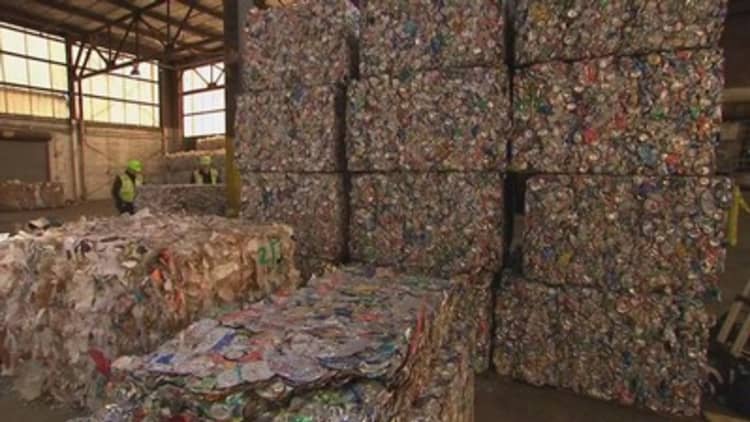
Dividing trash to be recycled has become a way of life for Americans. More than 34 percent of garbage is recycled, according to the Environmental Protection Agency (EPA), a gain of over 400 percent since 1960.
Those numbers notwithstanding, that progress could be halted as lower oil prices drive down profits in the recycling industry, according to at least one observer.
"When you look at our recycling business over the last 3 years when we really saw the downturn, it sort of fluctuated from slightly profitable to slightly unprofitable," David Steiner, the CEO of Waste Management, the largest recycler in North America, told CNBC's "On the Money" in a recent interview. A big part of that swing can be linked to cheaper oil, the executive said.
Experts say that because plastic is derived from oil, cheap crude becomes an incentive to make fresh plastic. That means recycled plastic becomes less attractive because of the work it requires to sort and clean it. All told, lower energy prices are creating a perfect storm for waste management companies.
"The combination of natural gas and crude oil being low means that virgin materials are much less expensive than it has been historically," said Michael Taylor, vice president for international affairs and trade at SPI: The Plastics Trade Industry Association.
Read MoreOil's winners and losers
An industry in crisis
Waste Management has closed sold or exited 30 of their recycling facilities over the past few years, about 21 percent. They say one or two more facilities may close in the future.
It's not only plastic recycling that is feeling the crunch, however. Steiner told CNBC the industry is in crisis as other commodity prices such as those for aluminum, copper, iron and paper have also fallen over the past 4 years. As a result, bales of aluminum cans used to sell for $2,000 per ton. Now, they only get $1,100 per ton.
Other factors affecting the recycling industry include the slowdown in the Chinese economy and the strengthening of the U.S. dollar. China used to buy many recycled materials from the U.S., but is now grappling with a slowdown. Meanwhile, the stronger U.S. dollar has made recycled commodities more expensive on the global market.
Municipalities used to make money from their recycling collection, with processing companies giving them a share of their profits. Now, many municipalities are no longer making revenue, or in some cases are actually paying companies to take the goods.
The value of recycling
Despite the problems, experts say recycling is here to stay. In addition to the environmental advantages and public support, many state laws mandate it. Companies, including Pepsi and Proctor and Gamble have made sustainability pledged to use recycled materials. Recyclers, like Waste Management, are working to make the industry more economically viable.
"Every material that we recycle has some value. The question is is the value of that material higher than the cost to collect and process it," Steiner said.
The end of recycling?
The company is also looking to educate consumers on how to recycle. Waste Management has found more of the recyclables they pick up from households are contaminated with items they cannot processed, such as plastic bags, garden hoses and even bowling balls. These items stop the machines from working, requiring costly stops and shutdowns.
Waste Management would like consumers to learn what items are recyclable and to clean recyclable containers.
"Every time you can help us get those processing costs down that means we can recycle more materials," said Steiner.
On the Money airs on CNBC Saturday at 5:30 am ET, or check listings for air times in local markets.





